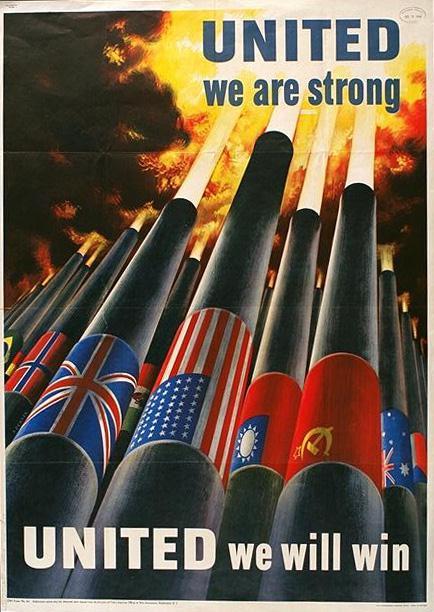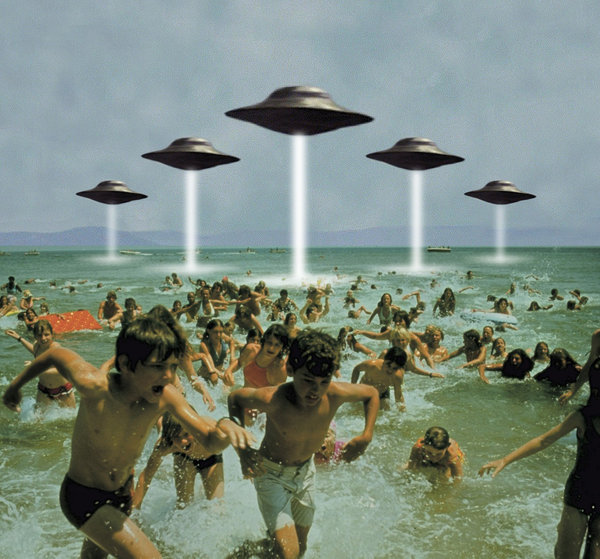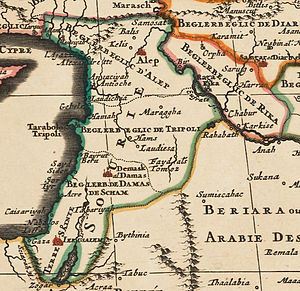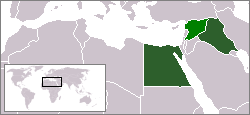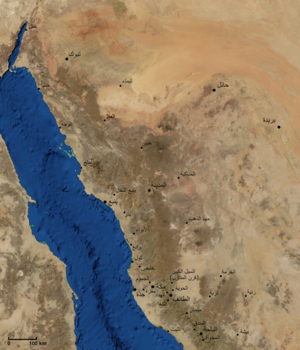
Notice all the brown. (Photo credit: Wikipedia)
Even the name sounds foreign. Hear it properly in Arabic, with its deep, swallowed sounds at center of the word, سعيدي and it’s hard to imagine a further away place. Saudi Arabia is, on the one hand, on the frontiers of Western imagination, a closed off, secret place associated with hot weather, sand dunes, and terrorists. It can seem baffling to an outsider, a walled off portion of the world beyond normal rules and comprehension. But like all human societies, the rules of geopolitics still apply. Figuring it out – and guessing its next move – is merely a matter of getting your facts down.
Arabia’s really fucking hot
Arabia is one of the most God-forsaken places on Earth. It’s a super hard place for humans to live, and ranks with Antarctica in its desolation. That the word “Arab” and “desert” are nearly synonymous is no accident, and Arabic as a language still feels constrained to the sands, as if it’s only natural in a hot, dry place.
Its complications stem from that. Arabia is divided into three topological zones – the vast, shitty sandy deserts, the slightly less miserable but equally dry mountain ranges, and the handful of relatively temperature mountain clusters.
And its geography makes water hard to find
In the sandy deserts, life is almost impossible. Thanks to the oases and wells scattered under the surface, people have made do for thousands of years in clusters of tents and small villages. The mountain ranges trap some moisture and allow a bit of pasture, but are only marginally less rough than the desert sands.
Because it was so hard to find even water, let alone food, the scattered peoples of the desert spent a great deal of time and energy finding and securing both. They had less time to think about esoteric ideals, like wondering if rape was bad or if bad was even worth worrying about at all. Culture was based upon chauvinistic strength as each group of people gathered into family-based tribes. Tribes that went against this grain were quickly wiped out. Literally, only the strong survived.
Around particularly large oases, towns and villages formed. But if that oasis dried up, that community was fucked and everyone either fled or died in rapid order. Water security was so difficult to guarantee that as soon as a civilization got going it fell apart because of lack of rain. The famous Iram of the Pillars (located in western Oman) was once a major trading city, but died a quick death as soon as its well went dry, consigned to the dust heap of legend.
Yemen was an exception, but may as well have been an island. Its power could never extend into the desert wastes. Patrolling, supplying, and securing the desert was a vast sink of money and it was far better for the kings of Yemen’s various dynasties to fight one another or to go looking for slave girls in Ethiopia. It’s for good reason that Yemen’s early history is far more tied up with the Horn of Africa than it is with Arabia.
These three zones made it goddamn hard to take over the whole thing
Arabian geography is not disposed to social or political unity. In the west are a series of mountains in varying degrees of miserable and tolerable. These were relatively easy to travel through and unify, but so poor it was often not worth it.
In the central and eastern deserts, communities clung to oases and wells, surviving by networks of traders bringing goods in and out. Only in two places – Oman and Bahrain – did proper civilizations form. Bahrain had a lovely fresh water oasis that remains in use to this day. Oman had a set of mountain ranges that trapped moisture and recharged wells all along its coast. Both, however, were isolated by the deserts and found it far cheaper to communicate and expand via sea. It’s no accident Oman’s empire went into Africa, to Zanzibar and Tanzania, rather than geographically closer central and western Arabia.
Imagine you’re in charge of two buildings. You can’t call or signal the other building because they can’t hear or see you and you don’t have a phone or the Internet. You have to physically send someone over there to find out what the fuck they’re doing and to tell them what they should be doing. But it takes six months to get a message back and then forth. Your messenger may well die along the way, too, and it’d take months to find that out. Meanwhile, your second building is paralyzed with indecision – they’ve got calls only you can make. How long until that second building says fuck it and starts doing things on their own? How long until your appointed manager decides he can get away with start his own company and pocketing the profit himself?
Arabia is the same way. The west, the Hejaz, was connected to the old centers of civilization up north via roads and trade routes. An army from Syria or Egypt could come down to Yemen by land and reasonably expect not to die of heat exhaustion on the way. But eastern Arabia may as well be on Tatooine inside George Lucas’s head. In between, it’s even worse, more like Frank Herbert’s Dune, full of nasty shit that itched to kill travelers.
Islam created a resource where before there were none
Prior to Islam, hardly anyone bothered with Arabia. Alexander the Great thought of conquering it on a whim before he died in Babylon. Rome sent troops and then, like a drunk sobering up during sex with an ugly person, pulled out as soon as they got a good look.

The sacred Kaaba at the heart of Mecca. This thing is a major cash cow. (Photo credit: Wikipedia)
Persia often just said, “Mine” in regards to the Gulf coast and nobody felt like disputing it.
Islam, therefore, proved to be a boom to this otherwise unfuckable landscape. One of Islam’s main stipulations is that you must visit Mecca before you die if you can afford it. As Islam gathered converts, more and more came to Mecca and dumped heaps of cash on an otherwise unappealing place.
The holy city, therefore, was the first must-have resource Arabia ever possessed. Suddenly, regional powers had a reason to invade.
And invade they did
Nobody but a Muslim power could benefit from Mecca’s pilgrims and the legitimacy the city bestowed (Nothing says “God loves me” like being charge of a holy city). Attack from the east was physically unfeasible (although, be it noted, not impossible), so only powers with bases in Syria and Egypt could move into the Hejaz. Unfortunately for Yemen, they often kept going south until they reached Aden. But they dared not waste their time trying to extend themselves over the whole peninsula. Not only would their armies likely die out, but there was nothing of value out there.
Meanwhile, in the desert, the natives remained restless
Competition in the sands was fierce. Fighting over wells and water resources sucked up most of their time. Tribes lived by raiding one another and any settled communities to get manufactured goods like coffee pots and weapons. But while they accepted Islam, this hardly made them any more peaceful or enlightened. Their isolation from the mainstream discussions about Islam kept them from developing their religion in line with Syria, Egypt, Iraq, and Iran.
This isolation also convinced them of their superiority as a culture, especially as they noticed that nobody but their culture group could survive in their desert. All their bad (and good) habits were eventually declared to be bestowed and sanctified by God, from cousin fucking to woman whipping. Nothing shut up the kids when they dared question their parents’ values by saying God wanted them to marry the hideous unibrow in the family.
And so it went until the 20th century
Without technology, people couldn’t get at the water deep underground. Without water, they couldn’t afford to build cities and develop industries where they could manufacture goods for trade. Without trade, they couldn’t get the technology to get the party started. It was a thrilling cycle.
People did try to unify the place, but found that rather hard
Tribes organized and battered one another, occasionally achieving supremacy but always collapsing under their own weight and infighting.
And it all boiled down to the lack of water and food
A successful tribe, having driven out their enemy or, better yet, butchered them all, naturally divided the spoils amongst themselves and their allies. These spoils were, more often than not, water and food. This increased their survivability and made them prone to winning the next battle, since they were in better health than their enemies.
A tribe could snowball this and end up with quite a bit of territory. But a critical breaking point was invariably reached. Either the tribe overpopulated, and found themselves ironically weakened by all their success, or their own members started to get greedy, causing infighting rival tribes took advantage of.
Had a tribe gotten super lucky and actually put together a near-kingdom, they’d quickly pose a threat to the nearby great power occupying Mecca. That great power would then roll into the desert, smoke out a few oases, and retreat again, leaving the tribes in disarray to start over. So even if a tribe got to the point of nearly settling the interminable wars of the interior, some foreigner would roll in and screw it all up.
Because reading and writing outside of religious studies weren’t priorities for the tiny populations of the desert, history in the interior is fuzzy. We know for a fact that this happened at least twice to the Saudi family, who built two kingdoms in the 18th and 19th century and then saw them collapse from internal squabbling or Turkish invasion.
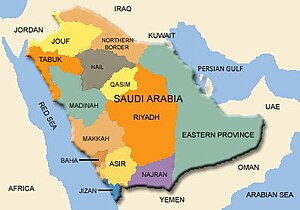
Saudi’s various regions. The ever-so-creatively named Eastern Province is where Saudi’s oil is located. (Photo credit: Wikipedia)
Meanwhile, outsiders carved up those bits worth carving
The Ottomans in the Hejaz developed rail lines to Mecca and Medina to help facilitate the cash flow brought by pilgrims from all over the Muslim world. Until the 1930s, this was the only reason for a great power to bother. When Britain fought Turkey in World War I, it outsourced the Arabian front to Arab tribes since Mecca had almost no value to them as a Christian power.
Britain, meanwhile, grabbed the east the same way as the Persians in antiquity – by sailing in and saying “Mine,” taking over with minimal effort. A Political Agent in Bahrain oversaw the entire Gulf and his main duties seem to have been to complain about the weather and remark on how boring his post was.
But oil changed the game quite suddenly
In the 1930s, geologists found Arabia’s second must-have resource. By this time, the Saudis had gotten lucky and had set up another proto-state, even securing Mecca and Medina. The collapse of the Ottoman Turks meant no outside power was hovering overhead, ready to intervene.
The new imperial power in town, Great Britain, had a different set of priorities entirely. Seeing no value from Arabia, Britain desired only quiet frontiers with its mandates in Jordan and Iraq. Anyone who ruled the interior had to provide that. The Saudis took the hint, and when some of their more hardcore warriors, the Ikhwan, started to raid British territories, the Saudis turned on them with a vengeance and wiped them out. Britain was duly grateful and sought not to interfere in Saudi’s nascent kingdom.
With Britain keeping neighboring powers out, the Saudi family got critical breathing space. When oil was found, it duly set up companies and oil derricks. Britain was not bothered with grabbing any of this up – they’d found plenty in Kuwait, Iraq, Bahrain, and Iran, all British holdings at the time. Only the U.S. was willing to invest in the horrible Arabian desert.
And so the state of Saudi Arabia was born
Without oil, Saudi would no doubt have collapsed yet again into anarchy, given enough time. Water and food are simply too scarce there to allow a proper state, which have to have dense populations, to survive. But oil allowed the Saudis to buy up heaps of technology to come in and change the environment while at the same time buying off the tribes, families, and regions who otherwise might have challenged them.
The fact that they had more money than God made everything possible. Rebellion was a thing of the past. The tribesmen, ever hungry, were happy to be given free meals.
And free meals led to free everything else
With each passing year, the Saudi family had to up the ante for their subjects. By the 1970s, it wasn’t enough to just be fed, and the Saudis started to build free houses, offer free education all the way through university, and set up free health care centers. With their small population and massive oil income, they could import all of this from the outside world.
As Britain withdrew from the Middle East in 1971, America stepped in to secure oil supplies. Once more, Saudi could count its borders safe as America’s fleets and armies guaranteed their integrity. In addition to oil income, which they did hardly any work for, Saudis could also write off national defense. Everything was easy street.
But the nature of their ruling system meant they could change little else
The Saudis were blood-stained conquerors who’d won their kingdom by killing everyone who stood in their way. Upon finishing that, desert tradition required them to dole out the spoils to their new subjects. Rebellion was stifled so long as these spoils arrived on time and in sufficient quantity. Change of leadership was out of the question for everyone concerned.
So the culture got frozen in time
The Saudis, too, had not gone through the same process as other Arab and Muslims states. These had encountered foreign cultures, fought and lost wars against them, and learned a great deal about what works and what doesn’t. Saudis, many of them illiterate, had little to no memory of their failed proto-states and knew only that God have given them oil and with it shitloads of money. They could be forgiven for suffering from cultural and religious arrogance, even xenophobia.
The ruling system was therefore entirely based on the supposedly supreme values of the desert. Although the ruling family always came first, they had to delegate, and so power was dispersed to those most conservative and most traditional.
Quickly, this resulted in myth-making and fantasy as Saudis basically made up their own history to justify their modern decisions (and they must have been quite pleased their ancestors were mostly illiterate fucks who might otherwise have contradicted them). What was already a hardline form of Islam became totalitarian, seizing radio, TV, press, and education. It then started to spread to other countries, believing their superior culture needed only to be exposed to the ignorant masses to establish supremacy.
In the meantime, technology made a shitty environment rather palatable

All them goddamn lights ain’t cheap. (Photo credit: Wikipedia)
Air conditioning, deep well pumps, desalination, cars, airplanes – all of it made the environment less important than it had been. Riyadh, once just a barely-there oasis (the g-string of the Arabian world) barreled into a multi-million person city, complete with malls, parks, highways, and airports. Babies that used to die of heat exhaustion in the tent went on to adulthood. Families that had two dozen kids expecting only five to make it instead sent them all off to free university. The population exploded and cities appeared from the dust.
The east-west divide became far less important strategically as roads and air links allowed the Saudi government to send directives at little cost. All modern technology was used to justify and sanctify Saudi culture and to degrade both foreign cultures and any Muslims who didn’t follow the Saudi way of life. As we’ve seen, the buckets of cash allowed Saudi to think God really did favor them.
And a weird fucking place was formed
Saudi Arabia has all the trappings of a proper country – a single language, ethnic group, religion, etc. It’s physically united through roads and airports and its national army can travel to and fro without harassment. It has all the ministries a country should.
But scratch the surface, and you’ll find the desert. In order to keep power, the Saudi royal family has, with each generation, needed to keep bribing at higher and higher levels. By the 1980s, food, housing, education, and healthcare weren’t enough; disposable income for toys, hookers in Thailand, and maids from the Philippines was the next step.
Alas, Saudi culture doesn’t mesh well with much besides living in a desert tent. Few Saudis knew how to do much more than pray, live in the desert, and judge people for not praying the right way. As immigrants set up businesses and industries, it was obvious Saudis had no idea how to do these jobs properly.
So Saudi’s government made jobs out of thin air, allowing Saudis to work for – well, the government itself. Short hours and long holidays helped empty out the office and nobody expected anything to actually be done. Can’t read or write? No problem! In the Ministry of Education you need only find the door. (Oh, it’s that one over there). It was just another way of giving handouts to key tribes. A job was a bribe; in exchange, you were loyal.
This worked for a long time because oil meant Saudi didn’t have to compete in anything
From the 1970s until the 2000s, Saudi didn’t have to be good – or even competent – at any of its supposed industries or businesses. Everything needed could be imported from abroad. Technology was overseen by foreign experts who took fat, tax free paychecks. Businesses of strategic importance were managed by immigrants. Saudis themselves needed only visit the ATM, as far the government was concerned (and the ATMs were probably installed by guys from Pakistan).
This isn’t to say individual Saudi citizens weren’t gifted and intelligent people – many of them took advantage of the free university education offered and became bright people in their own right. The problem, these gifted folks weren’t enough to run the country. The vast majority of citizens had no incentive to learn how to do anything except spend money and give lip service to their religion and culture. It created a skills gap of epic proportions.
The result is that the Saudi economy doesn’t know how to do anything
Saudis don’t have the education level to run their own country. Massive numbers of immigrants keep the system humming along. Those few qualified Saudis that exist won’t be promoted over more loyal or better connected Saudis who don’t know a goddamn thing because the royal family doesn’t value proper education. Properly educated people would notice the Saudi ruling system is bullshit and making things worse; even well-educated Saudi royals have probably noticed that.
The staggering ignorance still doesn’t matter – for now
So long as oil remains the primary income and immigrants remain willing to come into the country to work for tax free salaries, Saudis can get away with knowing nothing and doing less. Their regional security is still secured by the United States – Iraq’s foray into Kuwait ended the era of cross border invasions in the Middle East for at least this generation. So they can be isolated, dumb, and indolent.
But the oil money isn’t going as far as it once did
Oil money is used by the government to purchase loyalty. But the price is being inflated rapidly. Food, housing, healthcare, and education weren’t enough even in the 1980s – fun and entertainment had now entered the equation. The level of fun and entertainment have become inflated with each passing year, as well. One car’s not enough – most people want two cars. And not Nissans anymore. They want Landcruisers. Oh, also, they don’t want to pay for gas.
It’s gotten so bad that it’s predicted, by the 2020s, Saudi may actually need to import oil to cover all its losses in the energy sector. With gas, electricity, water, and air conditioning all subsidized, it’s no wonder Saudi is a horrifically wasteful place.
As salaries for worthless government workers go up, too, so also do prices in the Saudi economy. The workers produce nothing and don’t increase wealth – only the oil income does that. Inflation ravages and so the government has to pump ever more generous paychecks into the system.
The Saudi government says it realize this
Economic diversification and Saudization are the key words of the past decade. Attempts to reform this or that, to globalize education, to make Saudi workers more productive run up against the hard expectations Saudis have spent nearly forty years developing. Saudis want a lot and to work little. They refuse in large numbers to take jobs that offer anything less.

King Abdullah waving and saying it’s all cool. (Photo credit: Wikipedia)
And it all stems from the fact that the most important value to the Saudi royal family is blind loyalty through blind piety
God wants the Saudis in charge, and if you love God you must love the royal family too. Fuck everyone who says otherwise because they’re for sure going to Hell. This is the basic theme taught by the Saudi education system.
People who fail to follow these rules face immediate and harsh punishment. They’re not just going against the king, but against God, so honestly, to many religious people, no punishment is severe enough.
And so the Saudis have fucked themselves
To reform, Saudi must open the door to critical thinking to allow creative problem solving. Alas, when you open that door, you can’t shut it again. Critical thinking will notice asinine habits of Saudi society – like women being unable to drive, like people working very little but getting a whole lot because of family connections, like setting up farms in the middle of a sandy desert. It will notice all these problems stem from the bribes doled out by the ruling family and that the central problem is the royal family itself.
And that’s when you get a revolution
A clever monarchy reforms itself out of power but keeps many of the privileges. It does so at the pace its society is modernizing. Britain did that quite well and so the House of Windsor continues to enjoy Buckingham Palace. The French Bourbons, on the other hand, didn’t.
But unfortunately for the House of Saud, it’s impossible to tell just how quickly society is modernizing. Normally, you can get the feel of things through a free press or pop culture or even the Internet. But all those sources are controlled or regulated into oblivion, so even if Saudi’s government was watching carefully, they’d see nothing. It’s also happening at a pace unimagined before. Britain had the whole Industrial Age to flip from an absolute monarchy to a parliamentary one. Saudi may have just ten or twenty years.
Worse, the currency of the realm is still conservatism. Challenging this results in quick pushback from the religious folks, who are hardly above outright rebellion. The Shah of Iran could tell stories of what happens to a guy who modernizes too fast for his peoples’ liking.
Right now, bribes and fear keep the locals in line
If only Emperor Palpatine had used the Death Star to destroy planets and shower them with free gift cards, he’d probably have lasted a great deal longer. This is essentially the Saudi model. You can be arrested for anything even remotely anti-government or anti-Islam, and once in jail you’ll be raped as much and for as long as the police like with nary a peep from the press. But smile at the king’s portrait and say sternly conservative things about Islam and you’ll get a lovely new car.
But the regions are not as united as they appear

Coat of Arms of Saudi Arabia. Two things the whole country has in common: knives and palm trees. (Photo credit: Wikipedia)
Saudi is still a classic kingdom, with nobles and everything. There’s a culture divide between east, west, and center. In the west, long attached in some form to civilization, people are more likely to realize the Saudi system is not all its cracked up to be and that Islam has variant forms. In the east, once under Persian influence, Shi’a Muslims are well aware their government thinks they’re going to Hell and that they sit on most of the kingdom’s oil reserves. Only in the center – in Riyadh – where the Saudis originally came from and where people were most isolated – is loyalty most assured.
Damned if you do, damned if you don’t
Failure to introduce critical thinking into their culture will make Saudi non-competitive in a generation. Oil money only goes so far; it’s a finite well that doesn’t have to run out to become ineffective. As soon as Saudi cannot pay some ridiculous food or wedding bills to even a few citizens, they risk a cascade of complaints that could tear their kingdom apart. So Saudi must do something.
But critical thinking will invariably challenge everything Saudi society believes in. You can’t get a creative problem solving engineer who won’t notice working for a retarded royal cousin is bullshit. Additionally, Saudi’s official brand of culture is afraid of everything and convinced anything not Saudi is evil. Upon learning that nations don’t fall when couples kiss in public (or that flogging people is a terrible crime deterrent), Saudi citizens will reject the official culture and the government’s central legitimacy will be lost.
The likely future
Saudi probably won’t reform or, if it does, will reform poorly. The Saudi royal family is supposed to be ordained by God to rule; they’re not going anywhere. Saudi society isn’t ready to question their religion and culture in a way that doesn’t involve fighting, arrests, and civil unrest. The incentives to change just aren’t there. Forward-thinking royals will experiment here and there; one of them might be become a king. But all of them will be thwarted by the system they themselves created.
What will happen is the oil money will start to fail to solve society’s ills. Crime will go up; disobedience will increase. It will be a Saudi form of the 1960s, but far worse, as Saudi is still a tribal society. Tribes will pull away from the House of Saud as they are no longer bribed. They’ll support tribes that they think will restore the artificially imposed balance.
And nobody will know what the fuck they’re doing
Tribes will lie to acquire power. Saudi will either crush them, making more enemies and spiraling violence further, or will lose to them, at which point they’ll inherit all the same problems. A new tribe won’t solve the fundamental issue: Saudis will want more and more and the oil money will be able to deliver less and less. That attitude won’t change except after hard times realign Saudi society.
The odds are in the government’s favor – for now
The degree of violence used will entirely depend on the Saudi government. Right now, they’re far more likely to shoot on protesters or murder their enemies than negotiate. The National Guard, essentially a giant tribal bodyguard, is blood-connected to the ruling house and well-armed. Regular army units are treated as yet another jobs-but-really-bribes scheme and are terrible soldiers.
But they’ve got a problem – the United States
Alas, America’s values have changed. As the guarantor of Saudi security, America’s opinion counts. If the Saudi government turns on its people, like Syria, America will threaten all kinds of high hell, enough so as to scare members of the military and security services. The Saudi royal family, or at least part of it, could be shunted aside by these pro-American forces, like Hosni Mubarak was.
So the fight will be Saudi vs. Saudi
America will ensure nobody gets involved except Saudis. It will also quickly pick a side; whether it favors stability or reform will depend on the personality in the White House. But it will secure its interests, the oil exports, rapidly and effectively. It may well end up securing just the oil fields and letting Saudi society atomize and rot further afield. That alone would secure American interests.
There are, in other words, no good futures for Saudi Arabia
Saudi must reform, but can’t because to do so will probably destroy the royal family itself. The only way to change Saudi Arabia fundamentally is through a deep and long lasting trauma. It’s too late for the king to do anything.
Will it be a bang or a whimper?
Eventually, a trauma must realign Saudi society. The question comes, how big? Will it be a civil war? A running terror campaign? A 60s-style cultural revolution? Will the House of Saud die at home or in exile? Will they go peacefully or by machine gun? Regardless, it can’t last. Change is coming. The Saudis can only hope to mitigate the disaster.
The timeline is also up for grabs. One can guess in the next ten years or twenty that something big will happen there. But it certainly will happen long before the oil runs out. Saudi won’t suddenly wake up one day and find themselves broke. Societies don’t work that way. They’ll fall apart another way.
Like this:
Like Loading...

